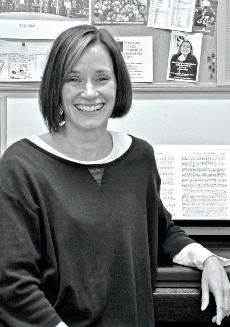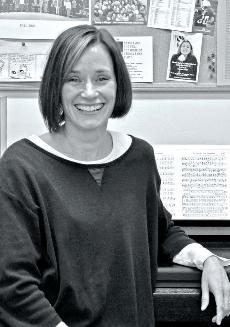
Photo by Minh Nguyen (nguyen, minh)
Rachel Young: What is your favorite class to teach at the Conservatory?
Julie McQuinn: What’s my favorite one? Can I have two?
Young: Yeah!
McQuinn: Favorite No. 1 is Borrowed Music in the Movies. We talk about the use of pre-existing music in film, and it’s mostly classical music, but we also talk about pop music, too. It’s really great because everyone loves movies, and I think students are sometimes like “wow, this is an upper-level music course but it’s about movies,” and “wow, that’s going to be so fun, but there’s so much going on in film that we don’t even realize that it’s going on!” I think everyone should take a class about film because film is, like, so dominant in our culture and we learn so much from it. But, anyway, I really love movies too, and I really think that the relationship between movies and music has all of this baggage with it so that when the two come together, they literally affect the meanings of one another. I also really like to teach Music and Gender – that’s favorite No. 2 – because it just rocks everyone’s world! Really! So many students have said to me, “I will never think about music in the same way again,” and to me that’s just tremendous! It’s tremendous, because music, just like everything else in our world, is completely, inextricably linked with gender, and we take that for granted, too. Students also give presentations in that class and I learn so much from them because a lot of times they present on music that I don’t really know that well.
Young: What do you think is one of the unique attributes of Lawrence’s Conservatory and its music program?
McQuinn: I find that the students here at Lawrence, and I’m speaking generally of course, are not only devoted to being really great performers on their instruments, but they’re really interested in taking a step back and thinking about what music means. I mean, the fact that Lawrence is a liberal arts college is really huge! It means that if you choose to come to the Conservatory, you’re not just coming to practice. You’re also taking other classes and doing interdisciplinary work. That’s why I love teaching here, because these students are so excited about my classes. Okay, not every single student is really excited about my classes but most are really, really excited about the ways that music intersects with ideas and meanings, and it’s because of that that I think the Conservatory is really cool.
Young: Your other undergraduate degree, besides vocal performance, was in mathematics. What made you want to pursue music at the graduate level, and what would you say to Conservatory students who are considering a double major now?
McQuinn: Oh, you should totally do it! Of course, not everyone should do it – I just think as much as you can learn, you should learn, and I think it’s interesting to see how different fields intersect. There are actually tons of intersections between music and math! I always knew, the whole time I was at Oberlin, I knew that I wanted to go to grad school in music. But, after I got a master’s degree in voice, I actually used my math degree and worked as a computer programmer for a long time because I wasn’t making a living as a singer. I was an applications specialist and I became director of MIS at a nonprofit organization. So, I actually worked using my math degree for, like, seven years, before I went back to school for my Ph.D. in musicology. That double-degree served me really well, but I did know at the time that when you do a double-degree you kind of have a feeling about which of the two you want to pursue, but it doesn’t negate the value of the other at all. You have to think about what you want to do – every student has to make their own decision. I think it’s really significant that so many of the conservatory students are double-degree. I don’t have the exact number so I’m not even going to guess but I know it’s a lot! It isn’t for everybody. Everyone’s different and you have to decide what you want your Lawrence experience to be like and it’s really hard to do. I think it’s really valuable for a lot of students, but everyone has to decide what their own path is.
Young: What music are you into right now? Do you have any recommendations for your students?
McQuinn: Right now, I am so hot on Regina Spektor! I listen to her more than anything, and I sing her in my kitchen more than anything [else].
Young: You said that one of your interests was borrowed music in film. Do you have any favorite film soundtracks? Do you think that you need the film to be able to connect the music with it?
McQuinn: Oh yeah! We could talk about this for five hours! We’d have to have beer if we talked about it! Well, “Amélie” is my favorite movie of all time, and I do love that soundtrack, and I do listen to it. But, that’s really exceptional. In some movies, part of the purpose of the music in the movie is to sell the soundtrack. I’m thinking of “Garden State”! I like that soundtrack a lot, but that’s different from other movies. What’s kind of cool about a soundtrack, if you’ve seen the movie and if the music is so distinctive like it is in “Garden State,” it can bring you back to that image and that emotion. I can listen to a piece from “Garden State” and remember where it was in the movie. I like the “Garden State” soundtrack but, in my Borrowed Music in the Movies class all that music has an identity before it came to be in the film. In my class we talk about Beethoven and Bach in music and of course I like all of that but I have to admit that I mostly, in my kitchen, listen to Regina Spektor and not so much to Beethoven.
Young: What significance has music had throughout your life? Do you think it has changed for you since you were in college?
McQuinn: Oh, it completely changed! It’s grown, it’s completely different and not different at the same time. One thing that I’m a little sad about since I got this job here is that I’ve become so busy that I hardly sing at all. When I lived in Chicago, I had a job as a soloist at a Christian Science Church. It was a great job, and they really love music there. I was there for years and would sing at weddings and at funerals, but now I’m always telling myself that I need to start doing it again, but then it just doesn’t happen. It’s hard but I think I’m kind of making peace with it. I am so grateful for this job that I have because I get to think about music all day long. I think about it when I’m prepping for class, when I’m grading papers, during class, and I get to make other people think about music too! I really love my job and the singing has been kind of a casualty. Who knows what could happen in the future? But as of right now, I’m really, really busy. That’s kind of the Lawrence thing.

Photo by Minh Nguyen (nguyen, minh)
